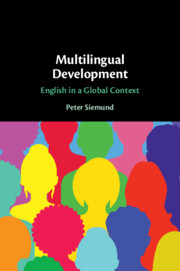Book contents
- Multilingual Development
- Multilingual Development
- Copyright page
- Epigraph
- Contents
- Figures
- Tables
- Preface
- Acknowledgements
- About the Author
- 1 Multilingualism
- 2 On Advantages and Effects of Multilingual Development
- 3 Cross-Linguistic Influence
- 4 Language Development in Multilingual Settings
- 5 Multilingual Language Policies, Identities, and Attitudes
- 6 The New Englishes in Their Multilingual Ecologies
- 7 Patterns and Limits of Multilingualism
- References
- Index
7 - Patterns and Limits of Multilingualism
Published online by Cambridge University Press: 17 January 2023
- Multilingual Development
- Multilingual Development
- Copyright page
- Epigraph
- Contents
- Figures
- Tables
- Preface
- Acknowledgements
- About the Author
- 1 Multilingualism
- 2 On Advantages and Effects of Multilingual Development
- 3 Cross-Linguistic Influence
- 4 Language Development in Multilingual Settings
- 5 Multilingual Language Policies, Identities, and Attitudes
- 6 The New Englishes in Their Multilingual Ecologies
- 7 Patterns and Limits of Multilingualism
- References
- Index
Summary
Monolingualism, bilingualism, and multilingualism represent concepts of individual upbringing and social organization of extreme impact and scope. All in all, the book attempted to guide the reader from a multilingualism-as-problem to a multilingualism-as-resource perspective. However, it also argued that multilingualism cannot work wonders and should not be considered a goal in itself. Running a multilingual society can produce many beneficial effects, but maintaining several languages at the same time also incurs costs that a society must be prepared to burden and share. It is crucial to know which boundary conditions tip the balance from burden to benefit, or vice versa. The book further argues for a continuum from monolingualism to multilingualism based on the dimensions of homogeneity and heterogeneity. It further introduces a novel typology of English in multilingual contexts, distinguishing between English in heritage contexts, English in bilingual heritage contexts, English in contexts of balanced bilingualism, English in indigenous multilingual contexts, English in postcolonial multilingual contexts, and English as a lingua franca in modern multilingual immigrant contexts.
Keywords
- Type
- Chapter
- Information
- Multilingual DevelopmentEnglish in a Global Context, pp. 227 - 253Publisher: Cambridge University PressPrint publication year: 2023

